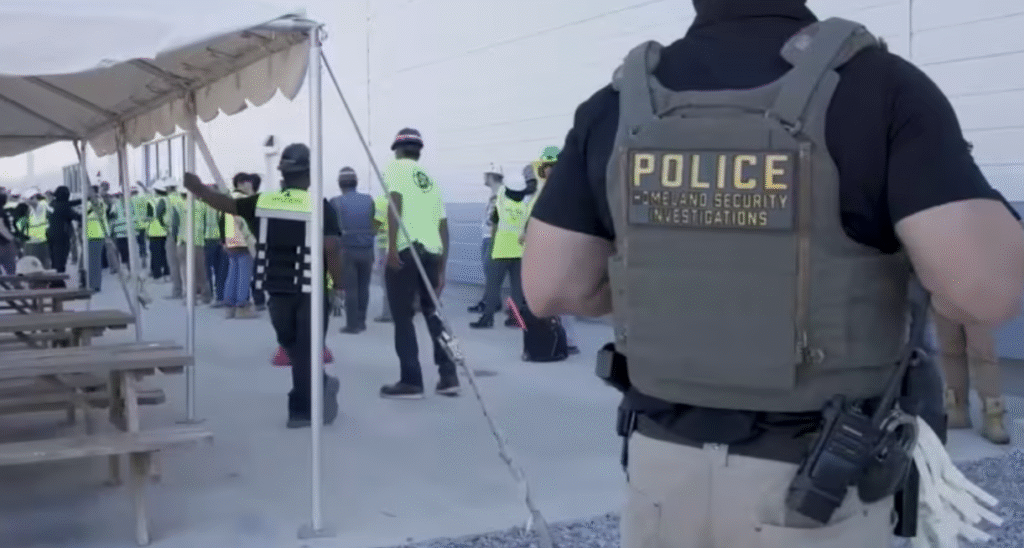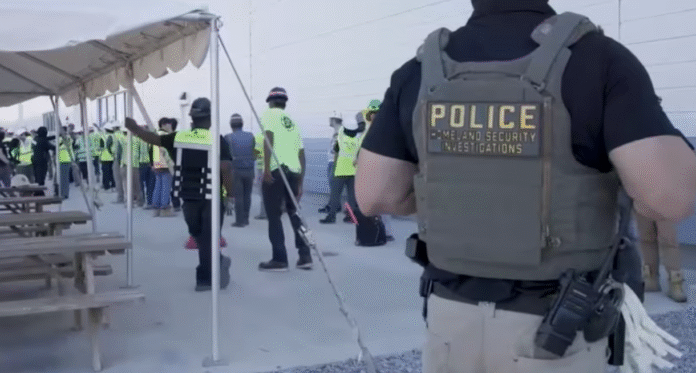South Korea Hyundai Raid Sparks Diplomatic Tensions
The South Korea Hyundai raid in Georgia has escalated into both a diplomatic challenge and a major business controversy. Nearly 475 workers were detained in one of the largest U.S. immigration operations in recent years, with more than 300 of those arrested being South Korean nationals.
South Korea’s presidential office confirmed it has concluded talks with Washington to negotiate the release of its citizens. A chartered flight will be dispatched to bring detainees home once paperwork and administrative procedures are finalized.
Officials in Seoul described the incident as “deeply concerning,” urging the U.S. to exercise caution in enforcing immigration rules against South Korean nationals working at critical joint-venture projects like Hyundai’s electric vehicle (EV) battery facility.

Why the South Korea Hyundai Raid Happened
The Hyundai Metaplant in Ellabell, Georgia, represents one of the state’s largest foreign investment projects. Built to manufacture electric vehicles and batteries, it employs thousands of workers and symbolizes close U.S-Korean economic ties.
But according to U.S. Immigration and Customs Enforcement (ICE), many workers at the site were unauthorized to work in the U.S. Agents allege that numerous employees were on short-term visitor or recreational visas that do not allow employment.
Special Agent Steven Schrank of Homeland Security Investigations (HSI) emphasized:
“This operation sends a clear message that those who exploit the system and undermine our workforce will be held accountable.”
ICE officials also claimed the operation was necessary to protect American jobs and crack down on illegal labor practices.
Trump Defends the Raid
President Donald Trump strongly defended the South Korea Hyundai raid, dismissing fears that it might harm foreign investment. Speaking from the Oval Office, Trump said:
“They were illegal aliens, and ICE was just doing its job.”
He also suggested that many of those working at the facility entered the country improperly under immigration policies of previous administrations.
This statement came at a delicate moment, as Washington and Seoul continue sensitive trade negotiations and South Korea pledges billions of dollars in U.S. manufacturing investments.
South Korea’s Response
Seoul’s government has taken urgent steps to protect its citizens. Kang Hoon-sik, South Korea’s presidential chief of staff, said:
-
A chartered plane is ready to fly detainees home once clearance is given.
-
Authorities are working on visa reforms to prevent similar incidents in the future.
-
Diplomatic talks are ongoing to ensure that business cooperation is not undermined by immigration disputes.
South Korea’s Ministry of Foreign Affairs expressed “shock” at the images of workers shackled outside the Hyundai plant, with some wearing yellow vests labeled “Hyundai” and “LG CNS.”
Impact on Hyundai and LG Energy Solution
Hyundai Motor Company stated that none of the detained individuals were directly employed by Hyundai. Instead, many worked for contractors or were employees of LG Energy Solution, Hyundai’s battery partner.
LG later confirmed that 47 of its staff and around 250 contractor workers had been detained. The company has since:
-
Suspended most business trips to the U.S.
-
Ordered employees currently in America to return home.
-
Reassessed its visa compliance protocols to avoid future issues.
The raid is particularly significant given that Hyundai’s EV plant was hailed as the biggest economic development project in Georgia’s history, employing over 1,200 people.
South Korea Hyundai Raid and Its Broader Implications
The South Korea Hyundai raid highlights the fragile balance between encouraging foreign investment and enforcing strict U.S. immigration laws.
-
For Trump’s administration, the raid aligns with his campaign promise to crack down on illegal immigration.
-
For South Korea, the incident risks damaging trust at a time when Seoul is investing heavily in U.S. manufacturing to avoid tariffs and strengthen trade ties.
-
For global businesses, the raid is a reminder of the legal and reputational risks of improper visa management.
South Korean media outlets have called the raid a “shock.” The Dong-A Ilbo warned that it could have “a chilling effect” on Korean companies operating in the U.S.

Workers Held in Georgia
At present, the 475 detainees are being held at an ICE detention facility in Folkston, Georgia. Officials have not confirmed how long they will remain there or whether deportation proceedings will follow.
For families of the detained workers, the situation remains uncertain. Some entered the U.S. on short-term business trips, while others were reportedly using visa waiver programs. ICE maintains that none had legal authorization to work.
Diplomatic and Economic Fallout
The South Korea Hyundai raid comes as both nations try to solidify economic cooperation amid global shifts in EV and semiconductor manufacturing. South Korea has committed billions to U.S.-based factories, partly to shield itself from tariffs and gain a stronger foothold in North America’s clean energy transition.
However, this raid raises fears in Seoul that Washington’s immigration enforcement could jeopardize its investments. It also risks creating diplomatic tension between two long-standing allies at a time when military and trade cooperation is critical.
What’s Next?
Observers say the South Korea Hyundai raid could prompt:
-
Stricter visa compliance by foreign firms operating in the U.S.
-
Increased scrutiny of contractors supplying labor to major manufacturing projects.
-
Heightened diplomacy between Washington and Seoul to prevent future incidents.
For Hyundai and LG, the immediate priority is stabilizing operations at the plant and reassuring investors. While production has not been halted, the long-term impact on their U.S. expansion strategy remains to be seen.

